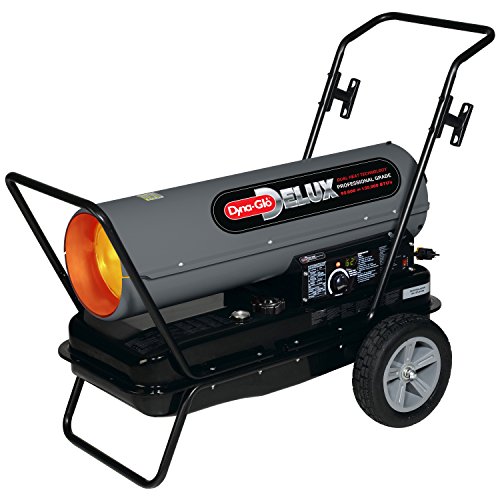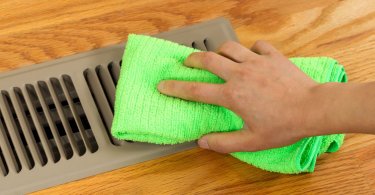Your garage is usually a productive area of your home where you may need to spend an hour or two every week. Using the workbench or maintaining your car can lead you to work in the garage, even in winter, which can be quite uncomfortable.
Before choosing between propane or kerosene heaters for your garage to stay warm and comfortable all year round, you have to weigh the efficiency of each type of heater against the space you want to warm up. You also need to pick the one that is best in safety and falls within your budget.

What’s More Efficient Propane or Kerosene?
Propane heaters are efficient because they don’t emit smoke, and the fuel source is cheaper per gallon in comparison to kerosene. You can run the heater for multiple days on a single tank. Plus, the propane heaters can warm up your garage much quicker, and you get more heat per square foot of the space.
One downside of using a propane portable heater is that they require good ventilation to function safely and efficiently. So, if your garage is not properly ventilated, you will have to install some vents before you place the unit.
For kerosene heaters, the fuel source produces more BTU’s per gallon than propane. That means kerosene heaters consume lesser fuel and give you greater efficiency per dollar than their propane counterparts.
However, keep in mind that kerosene heaters have a larger carbon footprint, so they require proper ventilation, or else the carbon monoxide build-up can be very hazardous to your health and safety.
Related Post: Propane and Kerosene Heaters That Work Without Electricity
Which is Safer: Kerosene or Propane Heater?
Whichever heater you choose for your garage, you should have a proper ventilation system for it. Both heaters, propane, and kerosene, emit carbon monoxide in different quantities, which can be lethal if ingested and needs to be vented out.
Propane is an odorless and highly flammable gas, so it demands extra caution. However, if there is a gas leak, the gas will only ignite as long as there is oxygen in the surrounding air.
Propane is also cleaner than kerosene, and it does not emit a strong smell or too many harmful fumes common to kerosene heaters.
In terms of flammability, Kerosene is not as dangerous for indoor use as propane because the spark has to come in contact with the liquid for a fire to start. In the case of liquid spoilage, you will be able to smell and see it, which is a big advantage for kerosene heaters.
Still, there is a risk of accidental fire and harmful fumes that kerosene releases when it burns.
Kerosene vs Propane Heater: Availability
There’s no point in making a choice when you can’t find the fuel where you live.
You can find a kerosene tank at camping stores and home improvement stores, but they are not the best deal you can get. Instead, buying kerosene from a gas station with a kerosene pump will be a wiser way to go.
If there are no kerosene pumps nearby your place, you can still search for them and stock up on some fuel. Or, you can choose propane heaters for more convenience.
Propane is more readily available for purchase as it is mostly used for gas grills. You are likely to find propane at home improvement stores, grocery stores, convenience stores, and a few other places.
You can even store propane in bulk by purchasing a large propane tank. But, large-scale storage might not be ideal for many users. It’ll be more convenient if you ask for a regular propane delivery at your doorstep.
Related Post: Does Kerosene Go Bad, and How Long Does It Last?
Which is Cheaper to Use: Propane or Kerosene Heater?
Propane heaters are efficient with a cost-effective fuel source. Propane will roughly cost you around $2.70 per gallon. But, as the costs fluctuate with fuel prices, the fuel might cost you differently throughout the year.
Despite that, you don’t have to worry about the propane quality and its effect on the heater’s efficiency, which makes the fuel a good choice.
Another advantage of propane heaters is that you get to choose how much heat output you want, so the quantity of fuel you want is up to you. If you require a higher heat output, it will cost you more, while a low, consistent heat will take up less fuel.
On the other hand, Kerosene costs about $3.30 per gallon. However, when you are calculating fuel costs for your heater, you have to take into account the amount of heat you are getting per gallon. In this case, Kerosene is more energy-dense than propane.
Another thing to keep in mind is that kerosene heaters require good quality kerosene to run smoothly while emitting the least bad smoke. Plus, better quality fuel also ensures more heat and saves you money.
As kerosene prices also fluctuate with the gas prices, the fuel costs you a different price each season.
Related Post: Best Indoor Propane Heaters
Best Kerosene Heater for Garages
The Dyna-Glo Forced Air Heater is ideal for warming up large garages of up to 3,200 sq. ft. The heater boasts Dual Heat Technology, which means the unit can run on multiple fuels. It gives an output of 135,000 BTU to provide heat inside your garage and even outside, all year round.
If you are getting a heater for the first time, the built-in thermostat and air pressure gauge will make it easy for you to monitor the unit. The manufacturer recommends using kerosene for optimal performance and longer life of the heater.
The whole unit has a robust and compact frame with a lift handle and a built-in cord wrap for mobility. You can easily lift the heater using the ergonomic handles without having to drag it on the floor or worrying about wires.
Pros:
- Dual heat technology
- Suitable for large spaces
- Built-in digital diagnostics
- Portable design
Cons:
- Emits a noticeable kerosene smell
Read also: is using a house furnace to heat a garage a good idea?
Best Indoor Propane Heater
Mr. Heater Portable Buddy Propane Heater is a liquid propane heater ideal for small to medium spaces indoors. It gives out 4000 to 9000 BTU with nearly 100% fuel efficiency.
Since the unit has no fan, you can hardly hear it when it’s running. One propane tank will give you about three to six hours of heat, depending on your heat settings. If you want more fuel, you can connect a larger propane tank with the heater using an extra hose.
A nice touch to this propane heater is a foldable top handle that saves space so you can store it in small places. You will also find the unit light enough to hang it on a wall. It is a great backup option for anyone who doesn’t have a fireplace or a wood stove.
Pros:
- High fuel efficiency
- Minimum footprint
- Very quiet
- Light and portable design
Cons:
- Top gets very hot
Summary
To sum up, both the opponents in the kerosene vs propane heater argument are efficient and effective to keep your garage warm all year round. Both of them are different from one another in a few aspects, so choosing between them comes down to personal preferences and specific needs.
To choose the better option for your garage, think about the space you want to warm up and weigh that against the abilities of both types of heaters. You can also calculate how much money you will be spending on fuel to make a well-informed decision.
Related articles:
How To Heat A Cold Basement Efficiently
How to Stop Kerosene Heater From Smelling and Producing Fumes






